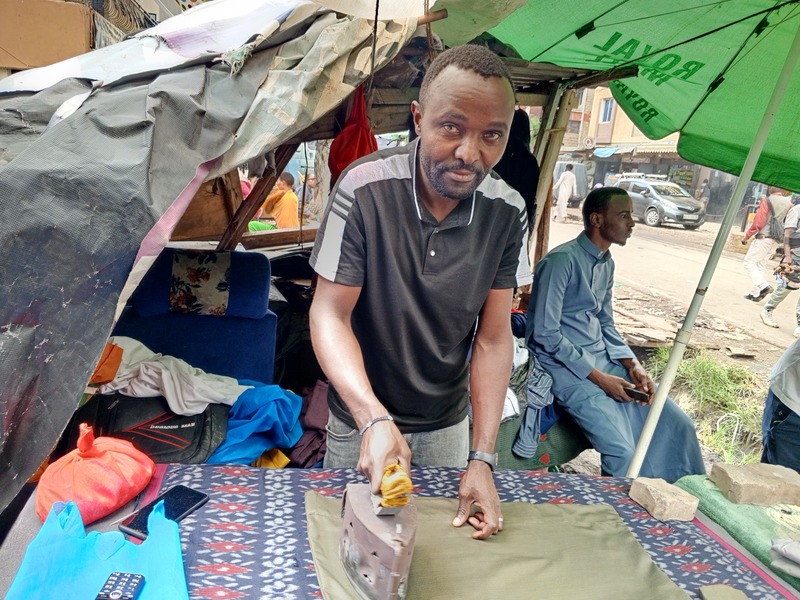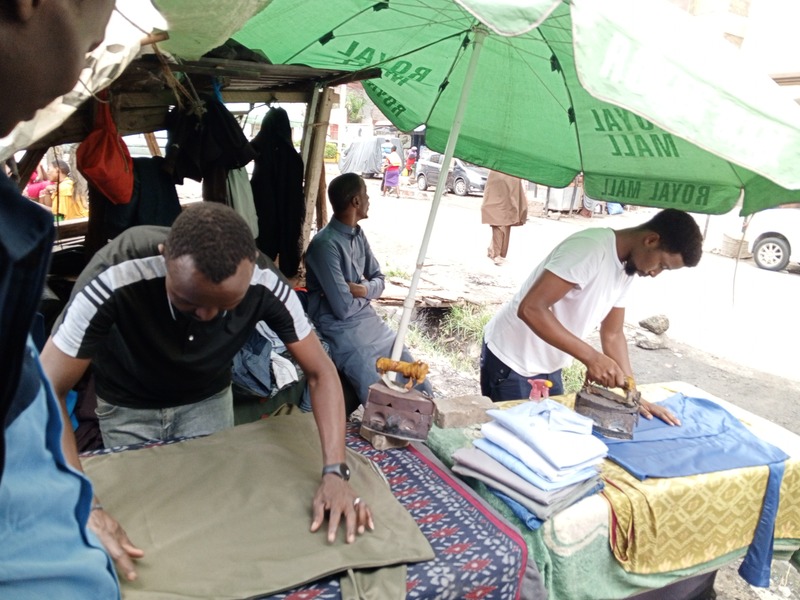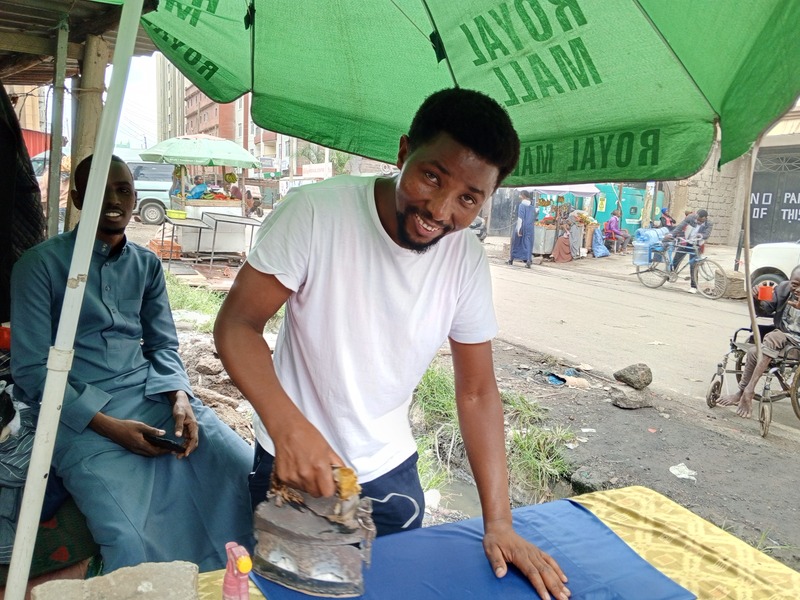Daily grind: Inside Paul Mole’s two-decade laundry business success

Reflecting on the growth of his business and the area, Mole highlights how rapidly Eastleigh has evolved, providing opportunities to many.
Ironing clothes is a household chore that some people enjoy while others dread. Finding time to iron can be a challenge for many, a need that Paul Mole identified in Eastleigh in 2002.
Every day, from dawn to dusk, a steady stream of people queue at his makeshift structure near the Fanya Bidii mosques, eagerly awaiting their turn to have their clothes ironed.
More To Read
- How community initiative is reviving Eastleigh’s cricket legacy
- Eastleigh MCA blames county officials for destruction of newly built Captain Mungai Street
- Youth football comes alive in Eastleigh as Fazam Academy clinches Moi Cup title
- Eastleigh’s 24-hour economy key to Kenya’s commerce, says CS Lee Kinyanjui
- Nairobi County, Eastleigh Business Association agree on food safety and restaurant licensing
- CBE curriculum spirit alive in Eastleigh as parents lead new wave of youth football development
Paul Mole, 45 and a long-time resident of Eastleigh, has been running an ironing and laundry business for over two decades, witnessing significant changes in the community through his venture driven by unemployment
"I was unemployed for a whole year back then," Mole recalls. "In my quest for opportunities, the idea of starting an ironing business came to mind, and I have never regretted it."
Mole shares that the business didn’t take off immediately, but he persevered and built relationships with the locals. "I started by ironing a shirt or a kanzu for Sh5. I learned about the culture and picked up a few Somali phrases to help me connect with the community better," said Mole.
He admits that hard work and building trust have been crucial to the growth of his business.
"We start early because most of our clients are business people with tight schedules. Many come late at night and wait for their clothes to be ironed. We do our best to ensure they are satisfied," he says.
His dedication has paid off, making his business a trusted service in Eastleigh.
 Paul Mole, 45, ironing clothes for his clients in Eastleigh. (Photo: Charity Kilei)
Paul Mole, 45, ironing clothes for his clients in Eastleigh. (Photo: Charity Kilei)
Mole and his team, consisting of four men and two women, not only iron clothes but also provide laundry services. Fees range from Sh30-60 for washing and ironing a shirt, while laundering and ironing kanzu costs between Sh50-100.
“We work together to ensure our customers are satisfied,” Mole says.
He acknowledges that the business faces many challenges but strives to meet the demand.
“Most of our clients are in a hurry, and sometimes it’s hard to keep up. This business also requires a sharp memory to remember which customer brought what, to avoid confusion,” he explains.
Despite occasional mix-ups, Mole says they’ve addressed this by having a storekeeper manage and monitor the clothes. Other challenges include water scarcity and changing weather conditions, but they strive to cope.
“Over time, we’ve evolved and made improvements like getting umbrellas and a place to keep clothes to avoid mix-ups. We’re still working on things like stickers and labels and aim to have a permanent structure to reach more clients,” said Mole.
Mole’s business serves Eastleigh, South B and South C, often taking contracts for home laundry and ironing services.
“This business has changed my family’s life. I’ve been able to educate my children, stabilise my family, and even provide opportunities for others,” shared Mole.
On a good day, Mole and his team can serve between 200-250 customers needing ironing and laundry services, both young and old.
“The secret of any business is patience and building relationships with the people you serve,” he advises.
 Denis Ndegwa, Mole's assistant, ironing clothes for clients in Eastleigh. (Photo: Charity Kilei)
Denis Ndegwa, Mole's assistant, ironing clothes for clients in Eastleigh. (Photo: Charity Kilei)
Denis Ndegwa, Mole's assistant, feels that his life has improved greatly since he started working there.
“This job keeps me busy and sustains me, and I’m happy to help out,” Ndegwa says with a smile.
He admits that the job can be challenging but has learned to handle it. “There’s a lot of pressure, and you can’t rush ironing clothes, but I’ve learned to manage it and do a good job.”
Ndegwa, who works part-time during busy periods, observes how the business has positively impacted many people’s lives. “People don’t worry about their clothes because they know they’ll get reliable daily service. This has improved how they interact with one another,” he shares.
Reflecting on the growth of his business and the area, Mole highlights how rapidly Eastleigh has evolved, providing opportunities to many.
"I've seen Eastleigh transform from just a few buildings to numerous multi-storey structures, attracting a diverse community of people. I'm optimistic about the future," he says.
Motivated by the desire to make a positive impact, Mole and his team eagerly anticipate more opportunities to support unemployed youth seeking jobs.
“Some families rely on this business, including vendors who sell food and other items like detergents to us. It brings me joy to be able to add value to their lives,” he adds.
Looking to the future, Mole plans to eventually pass the business on to someone else and transition to other opportunities while maintaining the enterprise.
Top Stories Today












































